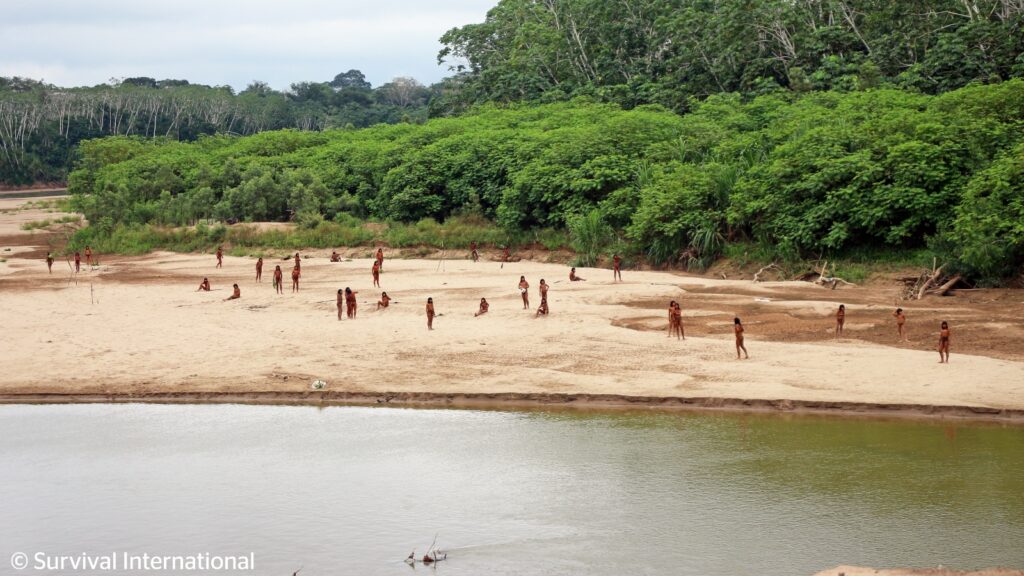Survival International
It is unfathomable for most people to wrap their minds around the fact that there are still multiple uncontacted tribes around the world with many in South America and some in India and Indonesia.
One such tribe of uncontacted peoples are known to the outside world as the Mashco Piro people and they are believed to be the largest uncontacted tribe. New footage of the Mashco Piro people has been released by London-based human rights organization Survival International after the Mascho Piro are on the precipice of being exposed to the outside world after they were photographed near a logging site in their native Southeast Peru.
Footage shows around 18 or more members of the uncontacted tribe on the bank of a river at a site just miles from a logging camp near the Yine village which is located in Monte Salvado in southeastern Peru:
With the Mashco Piro tribe seen just miles from a logging camp, the concern isn’t just that they will be exposed to the outside world which comes with the introduction of disease and massive disruptions to their way of life, there’s also concern that this tribe is extremely hostile to outsiders.
An official from Survival International spoke on this potential catastrophe in the making, saying “in a separate incident, another group, of 17, appeared near the neighboring village of Puerto Nuevo. The Yine, who are not uncontacted, speak a language related to Mashco Piro, and have previously reported that the Mashco Piro angrily denounced the presence of loggers on their land.”
After footage of the uncontacted Mascho Piro tribe emerged within miles of the logging camp, Survival International is calling for Peru to revoke the logging licenses and get the outsiders out of the region. A spokesperson for Survival International said there is now an “urgent need to revoke all the logging licenses in the area, and recognize that the territory belongs to the Mashco Piro people, which Survival believes is the largest uncontacted tribe in the world.”
The flip side of this is the logging companies have invested heavily in these operations which at first may sound like ‘oh wow, they’re spending tons of money to cut down trees’ but the reality is the Canales Tahuamanu has built over 200 kilometers of roads as part of their timber operation and that has brought in things like potentially life-saving medicine to the area.
There is no easy solution here of what to do. Companies have rights. Uncontacted tribes do as well. I don’t envy whichever Peruvian politicians are tasked with making decisions about what happens next.
But one thing is for certain and has been a certainty ever since outsiders started exploring deep into the Amazon Rainforest: if a hostile tribe comes in contact with the outside world there will be losses of life.
Dating back to the time when Teddy Roosevelt launched a joint expedition with Candido Rondon which came to be known as the ‘Roosevelt–Rondon Scientific Expedition’ where they became the first outsiders to map the ‘River of Doubt’ which later became known as the ‘Rio Roosevelt’ in honor of the former US President. If you don’t believe these uncontacted tribes will kill outsiders in an instant I urge you to go read The River of Doubt: Theodore Roosevelt’s Darkest Journey and learn about how they react to outsiders.
And if you’re not a Teddy Roosevelt guy, go read The Lost City of Z: A Tale of Deadly Obsession in the Amazon which revolves around the lost British explorer Perry Fawcett who went in search of ‘El Dorado’ or the ‘City of Gold’ and the leagues of explorers after him who also went missing, all after encountering uncontacted tribes.
Survival International Director Caroline Pearce echoed that sentiment, saying “This is a humanitarian disaster in the making – it’s absolutely vital that the loggers are thrown out, and the Mashco Piro’s territory is properly protected at last. The FSC must cancel its certification of Canales Tahuamanu immediately – failure to do so will make a mockery of the entire certification system.”
What happens next remains unclear but hopefully swift action is taken before there is a loss of life on either side.

